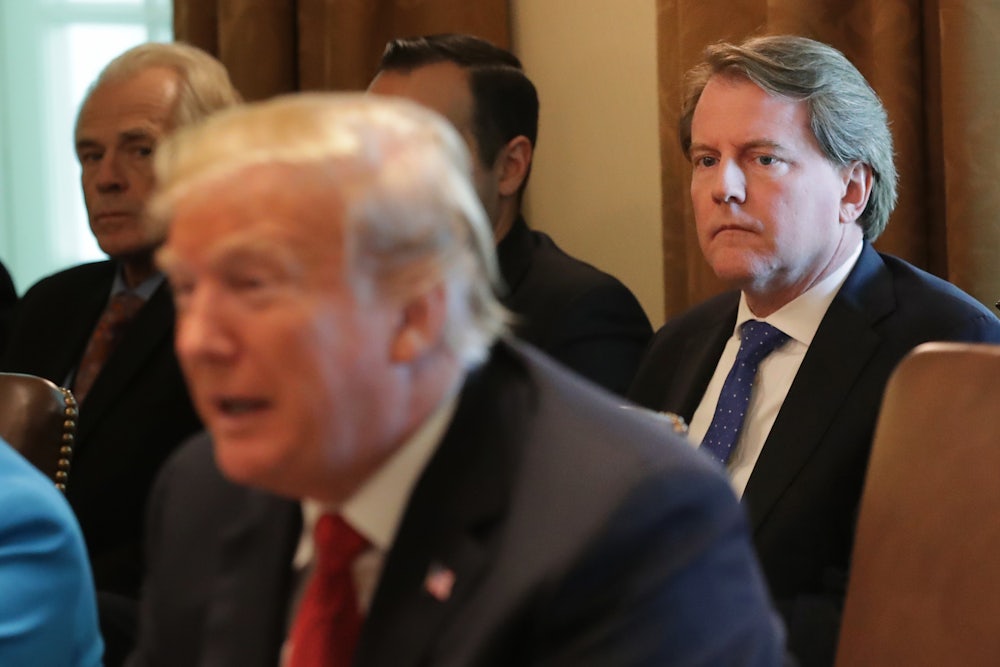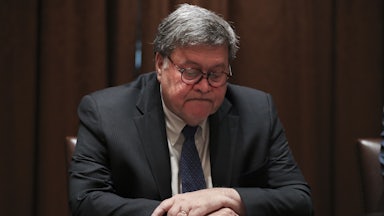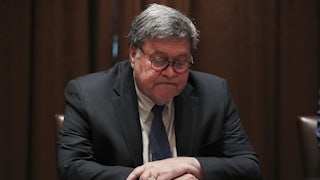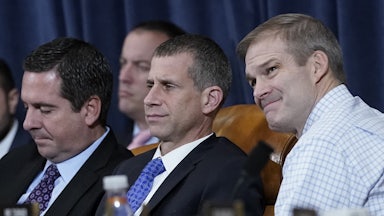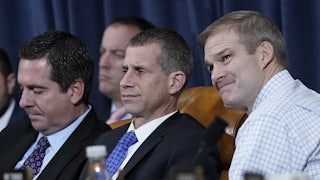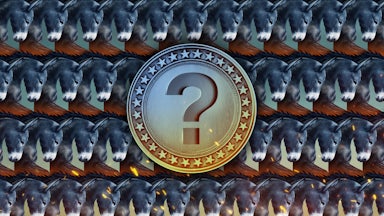This Friday at 10 a.m., two years after he should have done so, former White House counsel Don McGahn will testify before the House Judiciary Committee (in a “closed, transcribed interview,” as one source described it to me). McGahn, as you may recall from his cameos in the Mueller Report, is supposedly sitting on firsthand eyewitness accounts of Donald Trump obstructing justice. At last, he’ll be forced to spill some beans.
As the theater of Trumpian duplicity has largely moved from Congress to various (now no fewer than three!) law enforcement entities in the state of New York, it might seem that what McGahn has to say about an already out-of-office president doesn’t matter much. But I see an important thread that unites McGahn’s testimony with Trump’s current New York troubles. Even after all the five-alarm damage Trump did to our democracy, it’s actually kind of reassuring.
It’s this: Trump spent 50 years in the private sector blustering and bullshitting and lying his way out of every tight spot he made for himself. He no doubt entered public life assuming he could do the same. And for some time—certainly for too long—he did. But now he is learning that the public sector is different. There are things a thieving real estate tycoon can get away with that a president of the United States can’t. And this will be the precise source of his downfall.
The backstory of how McGahn came to testify is fascinating, and it proves my point that the wheels of justice, however slowly, do in fact turn.
The House subpoenaed McGahn to appear back in 2019, after the Mueller Report came out. Under instructions from Trump, he ignored the subpoena and thumbed his nose at the Democratic House and the 240-odd years of tradition of executive branch figures obeying such summonses, even during the Nixon years. House Democrats filed a suit. The Trump Justice Department fought the suit.
Then Joe Biden won the election and named Merrick Garland his attorney general, so the Justice Department passed from the hands of Trump’s worst enabler to an actual independent-minded leader. However, the department continued to defend McGahn’s position, out of concern that Republicans could take control of the House and possibly use the precedent against Biden administration legal advisers. But earlier this month, the Biden Justice Department dropped that posture, and that’s when the deal was struck forcing McGahn to testify.
In other words, a nonlawless Department of Justice decided that at the end of the day, defending an executive branch official defying a congressional subpoena was a bad idea. Hence, the law, in this case, has finally caught up to Trump.
There’s an additional interesting little wrinkle here; one that proves yet another point about Trump’s character. Trump himself was not party to the agreement to get McGahn to testify (obviously, since he would never so agree). But he has the right under the law to intervene and challenge the agreement. Right after the deal was struck in early May, a lawyer for Trump indicated that such a challenge was forthcoming. But more recently, that same lawyer said that Trump would, in fact, not intervene.
He gave no reason for the former president’s unexpected reversal, but a New York Times report suggested one possible explanation. As president, Trump could count on the taxpayers to foot the bill for whatever legal boulders he wanted to throw in the road of justice. But now, as a private citizen, he’d have to foot the bill himself. And it seems he chose not to.
Which is to say that Trump is such a skinflint that he’d rather risk McGahn telling Congress that, yes, the president personally directed him to commit obstruction of justice—to fire Robert Mueller and then to create a fake paper trail to suggest that Trump never asked him to do that—than have to shell out his own money to try to stop it!
So that’s one legal wall Trump has run into. And yes, it matters. If the facts stated in the Mueller Report are correct, and McGahn fesses up to them, it may not make any difference to the January 6 crowd, but we will have a president’s legal counsel on the record saying that the president obstructed justice. That’s a big deal.
The second and more prominent wall, of course, was the Supreme Court, which needed about three seconds to decide that Trump’s accountants did indeed have to turn over his tax returns to Manhattan District Attorney Cyrus Vance.
The court’s original ruling was delivered last July, at which time even Trump appointees Neil Gorsuch and Brett Kavanaugh joined a seven-justice majority concurring with Chief Justice John Roberts’s ruling that “no citizen, not even the president, is categorically above the common duty to produce evidence when called upon in a criminal proceeding” (Clarence Thomas and Samuel Alito dissented). In February, the court denied Trump’s emergency request to block a subpoena for the returns, ending the matter. This time, no dissents were publicly noted.
The walls are closing in fast. Vance just empaneled that three-days-a-week grand jury. New York Attorney General Letitia James is hard at work getting to the bottom of, among other malefactions, the funny business around that land in Westchester County. And now, we learned late last week, the Eastern District of New York has opened up a third front on Trump, looking into Ukrainian meddling in the 2020 election on his behalf.
I’m sure that when Trump decided to run for president, it never occurred to him that the law would catch him; he’d stayed a step ahead of it his entire adult life. Of course, he never expected, or wanted, to win, so I’ve always wondered if, after he did win, he secretly thought: Uh-oh, they’re going to catch up with me.
While I’ve given the idea credence, I still have doubts. Men like Trump don’t just think they’ll never get caught: After years of successfully dodging responsibility, they come to convince themselves that the reason they’ve never been caught is that they never really did anything wrong in the first place. They think they’re infallible. I hope to God that Trump is squirming and panicking these days, as he learns just how fallible he is.
